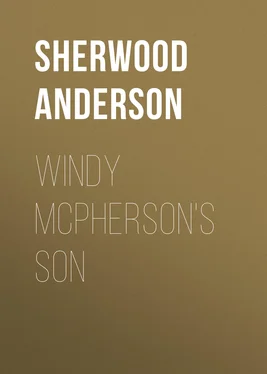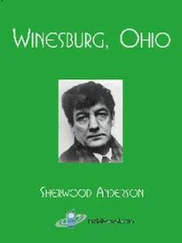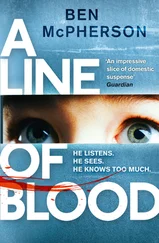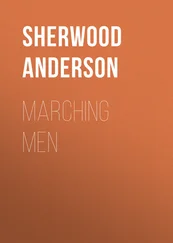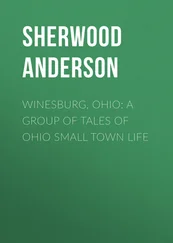Sherwood Anderson - Windy McPherson's Son
Здесь есть возможность читать онлайн «Sherwood Anderson - Windy McPherson's Son» — ознакомительный отрывок электронной книги совершенно бесплатно, а после прочтения отрывка купить полную версию. В некоторых случаях можно слушать аудио, скачать через торрент в формате fb2 и присутствует краткое содержание. Издательство: Иностранный паблик, Жанр: foreign_prose, literature_20, foreign_antique, на английском языке. Описание произведения, (предисловие) а так же отзывы посетителей доступны на портале библиотеки ЛибКат.
- Название:Windy McPherson's Son
- Автор:
- Издательство:Иностранный паблик
- Жанр:
- Год:неизвестен
- ISBN:нет данных
- Рейтинг книги:5 / 5. Голосов: 1
-
Избранное:Добавить в избранное
- Отзывы:
-
Ваша оценка:
- 100
- 1
- 2
- 3
- 4
- 5
Windy McPherson's Son: краткое содержание, описание и аннотация
Предлагаем к чтению аннотацию, описание, краткое содержание или предисловие (зависит от того, что написал сам автор книги «Windy McPherson's Son»). Если вы не нашли необходимую информацию о книге — напишите в комментариях, мы постараемся отыскать её.
Windy McPherson's Son — читать онлайн ознакомительный отрывок
Ниже представлен текст книги, разбитый по страницам. Система сохранения места последней прочитанной страницы, позволяет с удобством читать онлайн бесплатно книгу «Windy McPherson's Son», без необходимости каждый раз заново искать на чём Вы остановились. Поставьте закладку, и сможете в любой момент перейти на страницу, на которой закончили чтение.
Интервал:
Закладка:
Eleanor, who had turned to laugh at her husband, looked instead at the ground and a shadow crossed her face. Telfer, who had begun talking thoughtlessly, out of his excess of words, glanced from the woman to the boy. He knew that the suggestion regarding a child had touched a secret regret in Eleanor, and began trying to efface the shadow on her face by throwing himself into the subject that chanced to be on his tongue, making the words roll and tumble from his lips.
“No matter what may come in the future, in our day money-making precedes many virtues that are forever on men’s lips,” he declared fiercely as though trying to down an opponent. “It is one of the virtues that proves man not a savage. It has lifted him up—not money-making, but the power to make money. Money makes life livable. It gives freedom and destroys fear. Having it means sanitary houses and well-made clothes. It brings into men’s lives beauty and the love of beauty. It enables a man to go adventuring after the stuff of life as I have done.
“Writers are fond of telling stories of the crude excesses of great wealth,” he went on hurriedly, glancing again at Eleanor. “No doubt the things they tell of do happen. Money, and not the ability and the instinct to make money, is at fault. And what of the cruder excesses of poverty, the drunken men who beat and starve their families, the grim silences of the crowded, unsanitary houses of the poor, the inefficient, and the defeated? Go sit around the lounging room of the most vapid rich man’s city club as I have done, and then sit among the workers of a factory at the noon hour. Virtue, you will find, is no fonder of poverty than you and I, and the man who has merely learned to be industrious, and who has not acquired that eager hunger and shrewdness that enables him to get on, may build up a strong dexterous body while his mind is diseased and decaying.”
Grasping his cane and beginning to be carried away by the wind of his eloquence Telfer forgot Eleanor and talked for his love of talking.
“The mind that has in it the love of the beautiful, that stuff that makes our poets, artists, musicians, and actors, needs this turn for shrewd money getting or it will destroy itself,” he declared. “And the really great artists have it. In books and stories the great men starve in garrets. In real life they are more likely to ride in carriages on Fifth Avenue and have country places on the Hudson. Go, see for yourself. Visit the starving genius in his garret. It is a hundred to one that you will find him not only incapable in money getting but also incapable in the very art for which he starves.”
After the hurried word from Freedom Smith, Sam began looking for a buyer for the paper business. The place offered appealed to him and he wanted a chance at it. In the buying of potatoes, butter, eggs, apples, and hides he thought he could make money, also, he knew that the dogged persistency with which he had kept at the putting of money in the bank had caught Freedom’s imagination, and he wanted to take advantage of the fact.
Within a few days the deal was made. Sam got three hundred and fifty dollars for the list of newspaper customers, the peanut and popcorn business and the transfer of the exclusive agencies he had arranged with the dailies of Des Moines and St. Louis. Two boys bought the business, backed by their fathers. A talk in the back room of the bank, with the cashier telling of Sam’s record as a depositor, and the seven hundred dollars surplus clinched the deal. When it came to the deal with Freedom, Sam took him into the back room at the bank and showed his savings as he had shown them to the fathers of the two boys. Freedom was impressed. He thought the boy would make money for him. Twice within a week Sam had seen the silent suggestive power of cash.
The deal Sam made with Freedom included a fair weekly wage, enough to more than take care of all his wants, and in addition he was to have two-thirds of all he saved Freedom in the buying. Freedom on the other hand was to furnish horse, vehicle, and keep for the horse, while Sam was to take care of the horse. The prices to be paid for the things bought were to be fixed each morning by Freedom, and if Sam bought at less than the prices named two-thirds of the savings went to him. The arrangement was suggested by Sam, who thought he would make more from the saving than from the wage.
Freedom Smith discussed even the most trivial matter in a loud voice, roaring and shouting in the store and on the streets. He was a great inventor of descriptive names, having a name of his own for every man, woman and child he knew and liked. “Old Maybe-Not” he called Windy McPherson and would roar at him in the grocery asking him not to shed rebel blood in the sugar barrel. He drove about the country in a low phaeton buggy that rattled and squeaked enormously and had a wide rip in the top. To Sam’s knowledge neither the buggy nor Freedom were washed during his stay with the man. He had a method of his own in buying. Stopping in front of a farm house he would sit in his buggy and roar until the farmer came out of the field or the house to talk with him. And then haggling and shouting he would make his deal or drive on his way while the farmer, leaning on the fence, laughed as at a wayward child.
Freedom lived in a large old brick house facing one of Caxton’s best streets. His house and yard were an eyesore to his neighbours who liked him personally. He knew this and would stand on his front porch laughing and roaring about it. “Good morning, Mary,” he would shout at the neat German woman across the street. “Wait and you’ll see me clean up about here. I’m going at it right now. I’m going to brush the flies off the fence first.”
Once he ran for a county office and got practically every vote in the county.
Freedom had a passion for buying up old half-worn buggies and agricultural implements, bringing them home to stand in the yard, gathering rust and decay, and swearing they were as good as new. In the lot were a half dozen buggies and a family carriage or two, a traction engine, a mowing machine, several farm wagons and other farm tools gone beyond naming. Every few days he came home bringing a new prize. They overflowed the yard and crept onto the porch. Sam never knew him to sell any of this stuff. He had at one time sixteen sets of harness all broken and unrepaired in the barn and in a shed back of the house. A great flock of chickens and two or three pigs wandered about among this junk and all the children of the neighbourhood joined Freedom’s four and ran howling and shouting over and under the mass.
Freedom’s wife, a pale, silent woman, rarely came out of the house. She had a liking for the industrious, hard-working Sam and occasionally stood at the back door and talked with him in a low, even voice at evening as he stood unhitching his horse after a day on the road. Both she and Freedom treated him with great respect.
As a buyer Sam was even more successful than at the paper selling. He was a buyer by instinct, working a wide stretch of country very systematically and within a year more than doubling the bulk of Freedom’s purchases.
There is a little of Windy McPherson’s grotesque pretentiousness in every man and his son soon learned to look for and to take advantage of it. He let men talk until they had exaggerated or overstated the value of their goods, then called them sharply to accounts, and before they had recovered from their confusion drove home the bargain. In Sam’s day, farmers did not watch the daily market reports, in fact, the markets were not systematised and regulated as they were later, and the skill of the buyer was of the first importance. Having the skill, Sam used it constantly to put money into his pockets, but in some way kept the confidence and respect of the men with whom he traded.
Читать дальшеИнтервал:
Закладка:
Похожие книги на «Windy McPherson's Son»
Представляем Вашему вниманию похожие книги на «Windy McPherson's Son» списком для выбора. Мы отобрали схожую по названию и смыслу литературу в надежде предоставить читателям больше вариантов отыскать новые, интересные, ещё непрочитанные произведения.
Обсуждение, отзывы о книге «Windy McPherson's Son» и просто собственные мнения читателей. Оставьте ваши комментарии, напишите, что Вы думаете о произведении, его смысле или главных героях. Укажите что конкретно понравилось, а что нет, и почему Вы так считаете.
